
Bruce Bower
Behavioral Sciences Writer, Science News
Bruce Bower has written about the behavioral sciences since 1984. He often writes about psychology, anthropology, archaeology and mental health issues. Bruce has a master's degree in psychology from Pepperdine University and a master's degree in journalism from the University of Missouri. Following an internship at Science News in 1981, he worked as a reporter at Psychiatric News, a publication of the American Psychiatric Association, until joining Science News as a staff writer. In 1996, the American Psychological Association appointed Bruce a Science Writer Fellow, with a grant to visit psychological scientists of his own choosing. Early stints as an aide in a day school for children and teenagers with severe psychological problems and as a counselor in a drug diversion center provided Bruce with a surprisingly good background for a career in science journalism.

All Stories by Bruce Bower
-
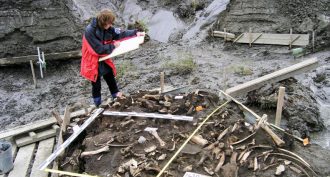 Humans
HumansDNA reveals clues to the Siberian ancestors of the first Americans
Researchers discovered a previously unknown population of Ice Age people who crossed the Asia-North America land bridge.
-
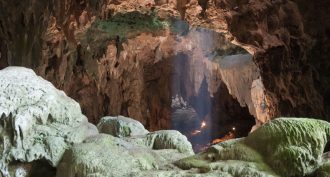 Archaeology
ArchaeologyFossils from a Philippine cave may come from a new human-like species
Ancient fossils from a Philippine cave may come from a new human-like species, which scientists have dubbed Homo luzonensis.
-
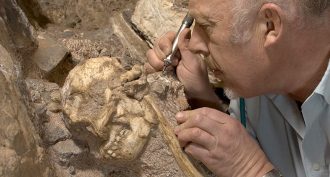 Fossils
FossilsA skeleton named ‘Little Foot’ causes big debate
New studies suggest a fossil hominid called Little Foot belongs to the species Australopithecus prometheus. Other scientists question whether such a species exists.
-
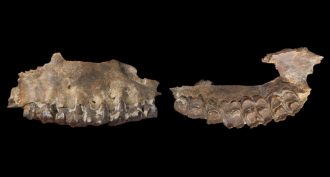 Archaeology
ArchaeologyFossils hint ancient humans passed through a green Arabia
Hundreds of thousands of years ago, migrating humans passed through the Arabian Peninsula, a study shows. Instead of desert, they found green grass.
-
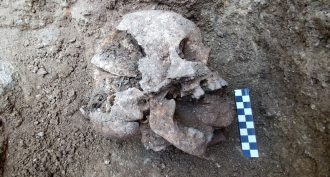 Archaeology
ArchaeologyAncient child’s ‘vampire burial’ suggests Romans feared the walking dead
A 10-year-old skeleton in a Roman cemetery had a stone placed in its mouth. It was to prevent this child from rising from the dead, a study reports.
-
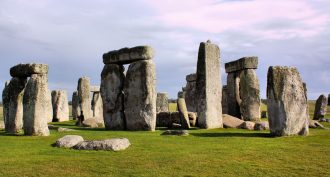 Archaeology
ArchaeologyCremated remains hint at who was buried at Stonehenge
A chemical analysis shows that people carried bodies from far away to be buried at the mysterious ancient monument known as Stonehenge.
-
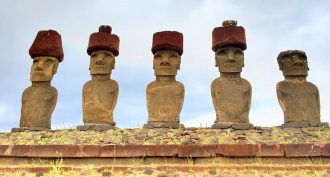 Archaeology
ArchaeologyPutting hats on Easter Island statues may have required some rock and roll
Fitting huge stone hats on 3-story-high Easter Island statues may have required only a small workforce armed with ropes and ramps.
-
 Psychology
PsychologyYour window to learn new languages may still be open
Results from an online grammar quiz suggest that people who start learning a second language at age 10 or 12 can still learn it well.
-
 Animals
AnimalsCompared to other primates, humans get little sleep
Short bouts of a sleep, called REM, separate humans from other primates, scientists find. Sleeping on the ground may have a lot to do with it.
-
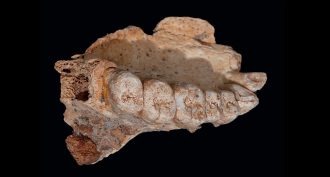 Fossils
FossilsAncient jaw suggests humans left Africa earlier than thought
A fossil jaw found in a cave in Israel is at least 177,000 years old. The scientists who found it think it shows humans left Africa much earlier than thought.
-
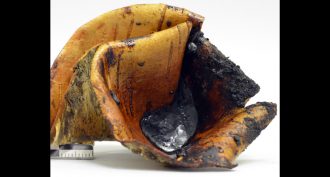 Archaeology
ArchaeologyFiery tests suggest gooey tech by Neandertals
Neandertals could have used simple methods and handy materials to make tar. It would have helped them glue their tools together.
-
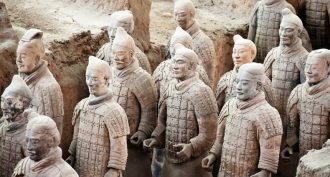 Archaeology
ArchaeologyClay reveals secrets of China’s mysterious terra-cotta army
Production of the famous terra-cotta troops found in ancient Chinese emperor’s tomb was made possible by a specialized system of clay manufacturing.